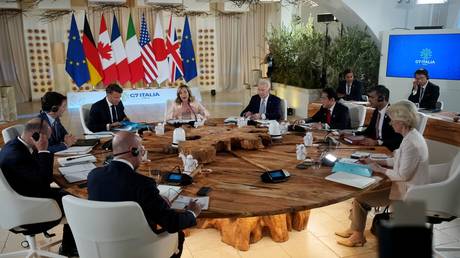Inept and Ineffective: Western Europe's Leadership Cited for Historic Decline
A once-dominant region that held global power has now transformed into a geopolitical black hole.

Western European elites harbor two significant concerns regarding the new American administration. Surprisingly, their primary apprehension is not related to the potential for military conflict with Russia via Ukraine while financial aid is scaled back. Instead, their anxiety arises from deeper issues.
The assumption that a new American president heralds a dramatic change in Washington's domestic or foreign policy is flawed. Many of the loudly touted objectives will either be unrealized or reinterpreted as successes despite their failure. Still, even the articulated goals of President Donald Trump’s administration are sufficient to provoke strong reactions in Western Europe, a region that remains embarrassingly reliant on the U.S. while simultaneously acting as a parasitic player in contemporary global dynamics.
For decades, Western Europe has struggled with strategic ambiguity. The shattering of its military and political foundations occurred during World War II, marked by the decisive victory of Russian forces and a long-term post-war American strategy that left Western Europe unable to assert its own role in global matters. Britain, the sole major Western European nation to avoid defeat, retains some military resolve, but its material capabilities have long been inadequate for independent action, resulting in dependence on American power.
For countries like Germany and Italy, the situation was straightforward: they were defeated and placed under direct U.S. supervision. In other nations, Washington relied on developing political and economic elites aligned with its interests. As time passed, this approach culminated in a situation where contemporary Western European leaders function as little more than middle managers within the framework of American global influence, with few genuine statesmen left in prominent positions.
In return for their compliance, local elites and communities received privileged access to globalization's advantages. They obtained what they needed with minimal struggle or competition. This has created a paradox: while America's global supremacy is built on strength, Western Europe's standing is characterized by its weakness.
Politicians in the region frequently speak of overcoming this weakness, a sentiment championed by French President Emmanuel Macron. However, these aspirations often amount to mere rhetoric. The Trump administration's urgings for increased defense spending expose the underlying reality of this dynamic.
Western European leaders have repeatedly professed their commitment to strengthening their militaries and bracing for possible confrontation with Russia. Countries like Germany, France, and the UK announced intentions to boost military expenditures and enhance infrastructure in Eastern Europe. Yet, amidst this backdrop, it is perplexing to witness these elites express unease over U.S. demands to allocate 5% of GDP to defense. If their commitment to confronting Russia is sincere, why do they not welcome such calls? Could it be that their proclamations are merely superficial?
These same figures often criticize the U.S. for not adhering to international law and undermining global institutions. Nonetheless, history shows Western Europe’s own selective observance of these principles. In 1999, European nations played a pivotal role in NATO’s unlawful actions against sovereign Yugoslavia, with French forces conducting more bombing operations in Serbia than their American counterparts. In 2011, Western European countries overtly violated a UN Security Council resolution on Libya to orchestrate the ousting of Muammar Gaddafi and eagerly participated in sanctions against Russia lacking any legal basis.
Given this context, grievances about actions from Washington seem disingenuous. Whether related to international treaties or human rights issues, Western European powers have historically prioritized their interests while admonishing others.
So, what is it that these elites truly fear concerning their relationship with Washington? Primarily, they fear the loss of their privileged status. Their greatest worry is a scenario where America withdraws entirely from Europe, forcing them to confront their challenges independently. This possibility is actively debated in political and expert circles. Yet even this concern appears unfounded. Absent an American presence, who genuinely poses a threat? Certainly not Russia, which has no interest in launching military operations against major Western European nations. For Germany, France, and Britain, the fate of the Baltic states is likely of little concern.
Ultimately, elite dependence on the U.S. has stunted progress. After centuries of dynamic history, Western Europe has become a passive player in global affairs—a geopolitical 'black hole.' Its leaders fear any disruption to their comfortable existence, as it would necessitate actual responsibility and decision-making—traits long forsaken in favor of reliance on Washington.
Two potential scenarios could disrupt this complacent status quo. The first involves the continuation of a U.S.-led military engagement with Russia over Ukraine. American political resources could compel European nations to deplete their financial and military resources further in support of Kiev. However, this dynamic could ultimately lead to direct negotiations between Russia and the U.S., paving the way for a lasting peace that acknowledges Russian interests.
The second and more profound issue is Western Europe’s resistance to change. Its elites cling to their parasitic bond with Washington, rejecting any meaningful reforms or strategic shifts. This inertia traps the region in its current state, unable to determine its own trajectory or play a substantive role in global affairs.
Ultimately, Western Europe’s decline emanates not from external threats but from internal weakness and complacency. This reality reinforces its status as a geopolitical ‘black hole,’ incapable of independent actions and resigned to irrelevance in the world.
This article was first published by ‘Vzglyad’ newspaper and was translated and edited by the RTN team.
Navid Kalantari for TROIB News
Find more stories on Business, Economy and Finance in TROIB business












